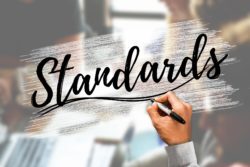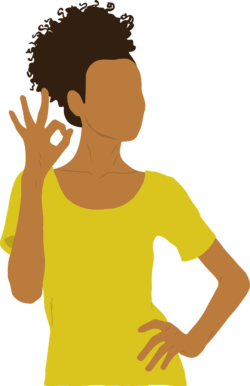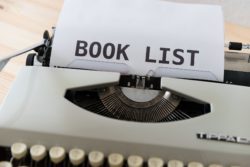Arlene Miller's Blog, page 22
October 22, 2021
Commas Made Easy (HA!)
 Image by Gerd Altmann from Pixabay
Image by Gerd Altmann from PixabaySomeone recently wrote to me and asked for a simple post on when to use a comma. Well, I will try, but there are so many comma rules…
On the other hand, there are really only two main comma rules (don’t get too excited):
Don’t use a comma without a reason/rule (The problem with this is you still have to know the reasons/rules.)Use a comma wherever not using one would cause the reader confusion.Okay, I guess I can’t end the post here. We still need some guidelines/rules/reasons. I will divide the rules into two categories: black and white, and shades of gray. (See that comma after white? That is a perfect example of using a comma where not using one might cause confusion or make something harder to read.
Black and White Comma Standards:Use commas after items in a series (words, phrases, or clauses) INCLUDING the comma before the and (Oxford comma): We bought chicken, potatoes, milk, bread, eggs, and Halloween candy.Use commas in dialogue. You learned how to in school: “Open the door,” she said. He said, “I can’t. It is locked.”Use a comma between two adjectives if it would make sense to pause and if you could put and between them: She wore an old, torn sweater over her bright blue dress.Around (or before if at the end of a sentence), etc, i.e., and e.g.: Apples, peaches, pears, cherries, etc., are fruits.Direct address: Sue, go to the store. Go to the store, Sue. Go, Sue, to the store.Addresses: 35 Monroe Street, Boston, MA 12345. We went to New Orleans, Louisiana, for our vacation. She was born in Dallas, Texas, in 1975.Dates when the day is included: It is March 12, 2021. I believe it happened in March 2021. In numbers with four or more digits: 9,600; 50,000.Around too in the middle of the sentence (when it means also), but not at the end: I, too, am going. I am going too.Around academic degrees with names: Mary Trump, Ph.D., has a new book.Before Jr. and Sr. in a name: John Doe, Sr. is my uncle. (none needed after the Jr. or Sr. )Usually before, Inc. or Ltd. in a company name: Heath, Inc. However if the company doesn’t do it, write the company name as they do.After the salutation and closing of letters and e-mails. For business communication, use a colon instead of a comma after the greeting: Dear John, Yours truly, Before, after, or around therefore and however: However, I think differently than you. I am not going, however. I think, therefore, that you should go.Contrasting statements: I love pizza, but not with anchovies.Before or when it explains rather than gives a choice: The stick, or baton, is used by the conductor.In confusing constructions: After eating, ants covered our blanket. (or just rewrite)Shades of Gray Comma Standards:In compound sentences, but not if there are very short: I am a Libra, and my brother is an Aries. (Note that this is not a compound sentence: He said he would help with the party decorations and then didn’t show up.) Introductory elements, but not if they are very short. (These are anything that appears before the main part of the sentence.): In July I will take a vacation. In July of next year, I will take a vacation. Before you come home, please stop by the store. In an earlier version of the book, the hero died. Of course I will come to your party. Interruptors in sentences if they are not needed for the meaning of the sentence: The girl who is wearing all red is my sister. The blonde girl in the front row, who is wearing all red, is my sister. My neighbor, a firefighter, works long hours. I am, incidentally, a notary public. Afterthoughts in sentences: I will always be your friend of course OR I will always be your friend, of course. (your choice)To clarify if a word (usually that) is omitted. I know you are not on my side (not confusing without the comma). The reason for the delay is, his mother is coming all the way from California (your choice).Emphasis (your choice): I agree, completely, with your idea. No Comma (another whole post!)Although you use a comma after a long introductory clause that starts with words such as although, because, since, until, etc., you rarely use a comma if those clauses end the sentence. If you would pause, that generally indicates you could use a comma:
Because you are always late for work, I am going to demote you.I am going to demote you because you are always late for work.There you go….The easy guide to commas! Remember this about commas: Many of the rules help clear up confusion; some of them don’t do much. Be familiar with the standards, but don’t worry so much. If something is unclear, try putting a comma in. But the worst thing is using too many commas.
October 15, 2021
New Words for 2021: I,J,K,L
Back to the Oxford English Dictionary (OED) and its new words. I believe we are on I. As I think I said somewhere recently, the OED seems rather conservative in its
 Image by mohamed Hassan from Pixabay
Image by mohamed Hassan from Pixabayentries, preferring to ignore more “slangish” or faddish words. However, I managed to find some fad words for this post:
I
iso (n) – a cell or block of cells in a prison or detention center where the inmates are isolated from one another
J
Juche (n) – The political ideology of North Korea
K
kaiso (n) – A style of Caribbean music, originating in West Africa, which is associated with carnivals and similar celebrations
Konglish (n, adj.) – Not too difficult to figure out, a hybrid language of Korean and English, often referring to an informal language spoken by Koreans
L
lightie (n) (potentially offensive, notes the OED) – Most commonly British Afro-Caribbean usage, referring to a black person who is light-skinned or to a person of mixed race
lime (n) – An informal social gathering or party. It is down the list of the definitions of lime, I assume the top one being the fruit!
livestreaming (n, adj) – Well, it’s about time for this one, which became very popular in the past year or two. The process of broadcasting an event live over the internet, or describing such an event
loud-mouthing (adj) – Vocal or outspoken
love lock (n) -A padlock attached to a bridge, fence, etc., by a couple as a symbol of their love and commitment.
Grammar Diva NewsThis afternoon, I will speak to my first international audience: The Chilliwack Rotary Club of Chilliwack, British Columbia, Canada. Virtual, of course. I just looked at my talk, which I have given before, and realized that some of the things I say might not apply to Canada as they do to America. I believe Canada follows British rules and spellings…
I plan to write, publish, and release The Best Little Business Writing Book Ever! in 2022. I am in very initial stages.
This week I have attended a virtual Romance Writers Conference. It has been excellent! Today is the last day. I have always thought about writing romance because I enjoy reading it (not the Harlequin series type of romance, but the more women’s literature type of romance. Not that there is anything wrong with any type of romance as long as it is well written! So I think I will try my hand at it. I intend to write a romance novel (first draft) for NaNoWriMo (National Novel Writing Month) this November. Wish me luck. I will need it!
October 8, 2021
Potpourri

 This week’s post is a bit of a potpourri (which I had to look up to make sure I was spelling it correctly. Not a word I use often!)
This week’s post is a bit of a potpourri (which I had to look up to make sure I was spelling it correctly. Not a word I use often!)






When you live in Florida and are self-employed, it is almost as if you are on a permanent vacation. And I am not one to take many vacations – at least not faraway vacations. Not that this one was. It was an hour away.
My son-in-law’s family had not visited from Canada in a couple of years because of Covid. The five people from Canada joined eight of us down here in Florida and rented a “compound” of four cabins about a block or two from the beach on Siesta Key. Until recently, I didn’t realize there were keys in Florida other than the chain of islands south of Miami, including Key West. But there are indeed some keys off the Gulf Coast of Florida, including the beautiful Siesta Key. Photos below. We had two small pools among the four cabins, which were pretty nice. No roughing it for us. I did bring my computer (as I always do) and managed to keep up my social media and e-mail to an extent. I was up at 7:30 or so, joining my son-in-law at the kitchen table as he worked remotely as well.
As usual, I brought a bunch of books to read (mostly on my Kindle) and managed to read about 10 pages over five days. I was insistent on finishing a book I had started at home. I didn’t really like it, but I hoped it would get better. I wasted my time getting through more than half the book before finally giving up at the end of the vacation. I had two library books I was trying to decide between. I didn’t want to bring them both, since I have 35 pages of books on my Kindle. So I looked at the Goodreads reviews of each of the two books and brought the one with the higher reviews. Wrong choice. When I got home I read the book I decided not to bring, and it was wonderful (The Last Bookshop in London in case you want to read it). The book I brought was appropriately titled Beach Read, but it was b-o-r-i-n-g.
I must confess the vacation was a challenge for me. I am an introvert and being with so many other people who are basically all related to one another except me was difficult. And once I got used to it and was having a fine time, it was time to go home. I also tend to get restless (type A — or ADHD????) and cannot just sit and chill or even sit and read. My son-in-law’s sister (who is much younger than I) read about a dozen fantasy books while we were there. I just couldn’t focus, partly because I brought my little dog who required some attention as she wandered around. She had the time of her life, being around so many people, as opposed to her usual life of watching me at the computer.









Well, here is a Siesta Key sunset and a photo from the Women’s March in nearby Bradenton in Manatee County. For some reason, my other two photos will not insert themselves.
FacebookSo Facebook happened this week. A few days ago a whistle blower came out (I didn’t watch the hearing) AND there was some press about Instagram (owned by Facebook) and how it is dangerous for young girls who try to compare themselves with the influencers who just might be thin and beautiful. I get it, but before Instagram, there were plenty of things for women of my generation to feel bad about: Seventeen Magazine, for one! In any case, Facebook, Instagram, and What’s App all went down for hours and hours the following day. Facebook never does that. And there were rumors that they were scrubbing files. Who knows?
You may or may not know that I am pretty active on Facebook with a slew of “friends.” I have always liked Facebook since I joined in 2008. I joined mostly to keep tabs on my daughter who was going off to tour with Disney on Ice after living with me the first 20 years of her life. Then I got pretty involved with it. I have a Facebook business page for The Grammar Diva as well as my personal page. I use Twitter and LinkedIn (and a little Instagram) too, but I mainly focus on Facebook because I am used to it. LinkedIn is probably the best social media avenue for my particular business, so I am trying to use it more .
I have been put in Facebook jail a couple of times on my personal page. And the day after Facebook went down, I saw that I was once again in Facebook jail for one day. No posting for me. But I was gobsmacked at what they put me in jail for (I have never used that word before!). Facebook would never have opposed the meme I posted (actually shared from someone else’s post) a week ago. They called the offense “self harm,” which was completely off the wall. I have a feeling all the things Facebook is in hot water for are probably still sitting there, and their posters are not in jail.
So, I am finally disgusted with Facebook and have decided to concentrate only on my Facebook business page. I will post my Coffee Mug of the Day and share humorous posts on my personal Facebook page, and that is about it. But I will continue posting on my business page — and on Twitter and LinkedIn. So much for Facebook.
Other ThingsI believe I have asked you this before, but this blog has been going since the beginning of 2013 — that makes it — yikes! Almost nine years old! 52 (okay a few fewer than that) posts a year. 468 posts! It is tough to think of new ideas. So if there is anything you would like to see or have any creative ideas, please e-mail me at info@bigwords101.com
Some things to come:
We will finish the new words in the Oxford English DictionaryA post about the two schools of thought in grammarSome quizzesA Halloween and other holiday postsA guest post I am waiting forA post about…..you will have to wait for that one. Wouldn’t want you to get a head start…Your suggestions….What I Am Working OnBesides getting my weekly blog posts written and keeping up with my e-mail (and tracking my book sales of course) — oh, and social media posts….. I am beginning the research into The Best Little Business Writing Book Ever, which I hope to publish in 2022. I am also planning an online grammar course of some type — maybe.

September 24, 2021
New Words for 2021: DFGH
A couple of weeks ago, I began this series of posts with new words beginning with A, B, and C that were recently added to the Oxford English Dictionary. You and I
 Image by MonikaP from Pixabay
Image by MonikaP from Pixabayboth noticed that some of the words seemed as if they were not new at all and had been around for decades. I am not sure how the OED goes about adding words, but I have noticed that they do not seem to include any pop culture words that come into the language. I will check it out later, but it appears that the OED is not interested in those words and intends to keep its elite dictionary status. In keeping with the OED, here are some of its new words beginning with D. F, G, and H:
decarcerate – To free a prisoner or prisoners from incarceration. Often used to indicate the wider initiative of decreasing the prison population.
disaster capitalism – Using disasters such as pandemics and climate catastrophes to make money.
drive-up – Noun or adjective. A bank, restaurant, or other business where you can drive up to a window rather than go into a building; description of such a business.
drivenness – The quality of being driven; ambitious
fassy – Noun. Sores or inflammation of the skin.
frick – Euphemistic form of fuck. Wow – when is the last time you heard someone say frick? And the Oxford Dictionary is just getting around to that one?? Usually, frickin’ is used, right?
ghost account – Originally a bank account set up by someone who has either died or forgotten about the account. Now used to indicate an account set up anonymously.
ghostie – Another word for a ghost (really???).
haggis-headed – Stupid or foolish, referring to a person.
hallyu – The increase in international interest of South Korean pop culture.
A short one this week because I will be on a family vacation….
September 23, 2021
In Regard To . . .
Several years ago, I wrote a book called Does Your Flamingo Flamenco? The Best Little Dictionary of Confused Words and Malapropisms.
After the book was published, I would occasionally find, or someone would send me, confused word pairs and misnamed idioms, most of which were not in that book. So I saved them in case I ever did a sequel to that book. I don’t know whether or not I will do a sequel, but here are some of those words and idioms:
 Image by Hatice EROL from PixabayWords
Image by Hatice EROL from PixabayWordsAloud/Allowed – Easy one. These have nothing at all in common. Aloud is an adverb meaning out loud. Allowed is a verb past tense (allow).
Apprise/Appraise – To apprise means to notify or inform. Appraise means to give a value to. She appraised the house at half a million dollars. Please apprise me of what happened at the meeting.
Apprehend/Comprehend – To apprehend is to take into custody. It can also mean to grasp mentally. Comprehend means to understand something, so apprehend can be used instead, but it is better to use the better understood comprehend to mean understand!
Assistance/Assistants – This reminds me of incidents and incidence, which I used to have as vocabulary words for my 7th grade English class. I added in instance, just to make it very confusing! They sound the same when spoken, but assistance is an abstract noun that means help. Assistants is the plural of the noun assistant.
Confidant/Confidante/Confident – Confident means possessing confidence or self-assurance. A confidant is a trustworthy person one confides in. Sometimes a female confidant is a confidante, but generally confidant is used for all genders.
Dragged/Drug – Dragged is the correct past tense of the regular verb drag. Regular verbs add -ed for the past tense. In some geographical areas, in some dialects, drug is used for the past tense of drag, but it is not standard. Drug is an entirely different noun or verb, whose past tense is drugged.
Persecute/Prosecute – To prosecute is to bring legal action against someone. To persecute is to punish, harm, or ridicule, often because of someone’s beliefs.
Shear/Sheer – To shear is to cut, as a lamb’s wool. Sheer is an adjective meaning see-through or transparent (as fabric) or an adverb meaning total or complete. It is sheer ignorance to believe that!
Simple/Simplistic – Simple means easy and uncomplicated. Simplistic has the same root, but indicates extreme and misleading simplicity. It is simplistic to think that we can accomplish that without extra funding.
Tortuous/Torturous – Tortuous means having lots of twists and turns, whether literally or figuratively. Torturous comes from torture and means extremely difficult or painful.
Idioms/PhrasesChamping at the bit/Chomping at the bit – The correct idiom is actually champing at the bit, although chomping seems to make sense! It means being impatient. Horses champ at their bits when impatient. or restless.
Deep seated/Deep seeded – The correct phrase is deep seated, which means ingrained. But deep seeded does seem to make sense and is often used.
In regard to/In regards to – The correct phrase is in regard to. We also use as regards, which does have the s. Both phrases are wordy and can usually be eliminated.
Toe the line/Tow the line – The correct idiom is toe the line. It means to follow the rules.
Tough road to hoe/Tough row to hoe – The correct idiom is tough row to hoe. It is very tough to hoe a road, but we do hoe rows.
Yesterday, September 24, was National Punctuation Day. If I had remembered, I might have written a post about punctuation. Oh, well!!;:”‘).?
September 17, 2021
New Words for 2021: ABC
 Image by Наталия Когут from Pixabay
Image by Наталия Когут from PixabayDictionaries. Does anyone even use print dictionaries anymore? You can easily look up a word in an online dictionary. And if you are reading on a Kindle, for example, you can just press on a word and get its meaning. But I bet most of you still own a print dictionary or two. I have two on my bookshelves. One is very, very old. I received it as an award when I “graduated” from 6th grade, presented to me and three other students for outstanding achievement in Scholarship, Leadership, Character, and Service. It is Webster’s New American Dictionary, copyright 1939, 1940, 1941, 1944, 1947. And I actually hadn’t been born as of these copyright dates. The other dictionary I own is also pretty old, although not as old and yellowed as the first. It is Webster’s New World College Dictionary, copyright 1996, 1994, 1991, 1988.
How old and quaint some of the words in those dictionaries must be: no social media, cell phone, texting, or mansplaining entries in them. Dictionaries are not as static as one might think. They are regularly updated with new words and phrases. And they are not all updated with the same new words and phrases, although there is obviously some overlap. One of the best books about updating dictionaries is a book I have recommended before – Word by Word: The Secret Life of Dictionaries by Kory Stamper. It, too, is a bit outdated, as it focuses on updating print dictionaries.
Although all dictionaries update regularly, I am going to talk about the OED, the mother of all dictionaries: The Oxford English Dictionary, which is updated with thousands of new words every year. It is updated quarterly. New entries are added, but subentries under the main entries are also added and revised. Here are some recent updates (September 2021) to the OED.
New entriesanti-vax and anti-vaxxer (adj. n) – Describes someone against vaccinations; someone who is against vaccinations.
bants (n) -Playfully teasing or mocking remarks exchanged with another person or group, esp. among men; banter.
bassa-bassa (n) -Trouble, commotion; a noisy altercation; a fight.
brata (n) -An extra amount or small gift added to a purchase by a seller, esp. in a market, to encourage the customer to return.
brown-nosing (n) -Excessive or insincere flattery, esp. with the aim of gaining favour or advancement. (I find it hard to believe this entry is new!)
bulgogi (n) -In Korean cookery: a dish of thin slices of beef or pork which are marinated then grilled or stir-fried.
cardioversion (n) -The treatment of atrial fibrillation and other cardiac arrhythmias by means of a direct-current shock to the chest. (Also hard to believe this one is new.)
Conchy Joe (n) -A Bahamian who is white or of mixed black and white descent.
I just noticed that there are no verbs on my list. I would think there would be fewer verbs than nouns and adjectives. I mean, it has all been done before, right?
New subentries
These words and phrases are additional subentries for the word in parentheses.
Asian miracle (Asian) (n, adj) -The rapid economic growth of certain East Asian countries (esp. Hong Kong, Singapore, Taiwan, and South Korea) in the second half of the 20th century.
Asian pear (Asian) (n, adj) -The nashi pear, Pyrus pyrifolia, native to eastern Asia.
bath bomb (bath) (n) – A ball or other-shaped item made of a perfumed substance or mixture which dissolves when placed in water (typically with effervescence).
to be a beast (beast) (n, adj) – Colloquial. To be someone who is exceptionally gifted, adept, persistent, or hard-working.
big tech (big) (adj, n) -Major, multinational technology companies considered collectively as a sector of industry; frequently as a modifier.
caravan tea (caravan) (n) -Tea transported overland from China to Russia rather than by sea, commonly thought to acquire a distinctive and superior flavour.
cardiac output (cardiac) (n) – The quantity of blood pumped by the heart in a given period of time (typically measured in litres per minute). (New phrase??)
cardiganed (cardigan) (adj) – Wearing a cardigan. ( are vested, shorted, pantsed, skirted, shoed, and socked similar words?)
to catch one’s arse (catch) (v) – Caribbean: to suffer or undergo misfortune, hardship, or difficulty.
conjure bag (conjure) (n) -A charm consisting of a small bag or pouch containing an assortment of objects such as herbs, hair, coins, etc., intended to be used to ward off evil.
Need to brush up on your grammar? All books available in paperback and e-book.New review for The Best Grammar Workbook Ever!
I normally don’t write reviews about anything but this book genuinely deserved one. I was never great at grammar but I always wanted to improve my grasp of the English language grammatically. I never could do that though because most grammar books that were provided by my school were either boring or overly complicated. However, this book literally is the best grammar book I have ever had the pleasure to open. It’s engaging and I feel like I am learning. Honestly, I look forward to opening it again because the author really make this book in such a way that makes me feel like I can truly graso grammar. I am happy with my purchase and the title of this book really speaks for itself.
September 9, 2021
OK? Okay? Ok? O.K.?
OK is probably the most widely recognized word in the world regardless of the native language of a country.
And all of its spellings are OK: okay, ok, O.K.. OK
So where did this useful word come from?
Historian Allan Walker Read researched its origins, which were published in OK: The Improbable Story of America’s Greatest Word by Allan Metcalf, published in 2010. In this definitive book, Metcalf traces it back to an 1839 article in the Boston Morning Post.
There was no Associated Press or other wire services in the 19th century, so newspapers relied on other newspapers they traded copies with for their out-of-town news. And in those quaint days, there just wasn’t as much news, so newspapers added bits of humor and poetry into their pages.
We are all familiar with LOL, BRB, OMG, and other abbreviations that we use in texts. Well, abbreviations are nothing new. One newspaper fad at the time was the use of abbreviations such as i.s.b.d (it shall be done), r.t.b.s (remains to be seen), and s.p. (small potatoes). A New York newspaper in 1839 reported a young woman saying to her male friend “O.K.K.B.W.P.” (one kind kiss before we part).” Bet you haven’t used that one before.
In addition to using quirky abbreviations, newspapers in the 1820s and 1830s liked to use deliberate misspellings for a bit of humor (oh, those journalists!). They turned no use into know yuse, all right into oll wright. No go became know go, and combined with the love of abbreviations became KG. And all correct became, as you might now guess, oll korrect. Abbreviation? OK
And then, to put the icing on the cake, let’s look at the 1840 presidential election. Candidate Martin Van Buren was from Kinderhook, New York, and was given the nickname “Old Kinderhook.” His fans joined “OK Clubs” nationwide, further popularizing the expression.
Some believed that “Old Kinderhook” was the origin of OK. Others believed in all sorts of etymological beginnings of OK, including from the Choctaw word okeh. Other unproven ideas are that OK comes from the Haitian port Aux Cayes, the Louisiana French au quai, a Puerto Rican rum labeled “Aux Quais,” the German alles korrekt, the Scots och aye, the Greek olla kalla, or the Latin omnes korrecta.
But Metcalf says that etymologically, OK has “no direct relationship with Latin or Greek or any other ancient tongue.”
Some interesting tidbits about what Metcalf says is the most frequently spoken (or typed) word on the planet:
I got a raise!! OK! – An enthusiastic cheerThis pizza is just okay – MehOK. Let’s move on to the next agenda item – An indication of switching topics The doctor okayed me to drive – Even used as a verb!Okaaaaaaay or Oooookay – Passive aggressive formOkay – What I said when I finished writing this post. K – Just plain lazyA thumbs up or an O made with the thumb and index or middle finger – Silent OKOK was one of the first words spoken on the moon.By the 1870s, OK became the standard way for telegraph operators to acknowledge receiving a transmission – it is, after all, shorter than Yes.In 1864, OK appeared in the Slang Dictionary of Vulgar Words (doesn’t seem very vulgar).One of the most famous self-help books written is Thomas Harris’s book, I’m OK, You’re OK, published in 1967.In 1943 Rodgers and Hammerstein called Oklahoma OK: “You’re doin’ fine, Oklahoma! Oklahoma OK.” (L-A-H-O-M-A)
The doctor okayed me to drive – Even used as a verb!Okaaaaaaay or Oooookay – Passive aggressive formOkay – What I said when I finished writing this post. K – Just plain lazyA thumbs up or an O made with the thumb and index or middle finger – Silent OKOK was one of the first words spoken on the moon.By the 1870s, OK became the standard way for telegraph operators to acknowledge receiving a transmission – it is, after all, shorter than Yes.In 1864, OK appeared in the Slang Dictionary of Vulgar Words (doesn’t seem very vulgar).One of the most famous self-help books written is Thomas Harris’s book, I’m OK, You’re OK, published in 1967.In 1943 Rodgers and Hammerstein called Oklahoma OK: “You’re doin’ fine, Oklahoma! Oklahoma OK.” (L-A-H-O-M-A)O.K.????
Thanks to the following websites for the information in this post:
September 3, 2021
Blaming Amazon
 Image by kirstyfields from Pixabay
Image by kirstyfields from PixabayI have run into a few people — even friends of mine — who say they are boycotting Amazon because Jeff Bezos pays no taxes.
On the other hand, I order from Amazon nearly every day, probably more so since the pandemic. I often get packages (I know some of you can relate to this), and I don’t even remember what is in them. If I need something small (and these are things I have actually ordered) — some post-it notes, a wrench — and I need it now, I will look for something that has one-day delivery on Amazon Prime.
However, there are stores I would not buy from. I will never go into a Hobby Lobby or a Chick-Fil-A. I don’t care for their anti-gay, evangelical views. But am I boycotting them? Probably not, since I have never been into these stores anyway. I have never even seen a Hobby Lobby anywhere near where I live. I have thought about boycotting Home Depot, but I go in there occasionally.
My basic feelings about boycotting? Not a good idea. It doesn’t hurt the rich owners. It hurts the little guy or girl.
So back to Amazon. I personally get upset when someone tells me they are boycotting Amazon. You aren’t hurting Jeff Bezos. You are hurting me (and others like me).
I completely understand those of you who want to buy your books in brick-and-mortar bookstores — or online from indie bookstores. I love and support independent bookstores. My local indie bookstore in California (when I lived there), Copperfields, gave me so much support. I launched all of my books there. I spoke and gave workshops there. And when I need to give a gift, a Copperfield’s gift certificate is right on the top of my list. Personally, I don’t have money to spend on books, so I buy them only occasionally. Generally, I get my books from the library.
But I can tell you my personal story of how, as an author, I depend on Amazon.
It may not be hyperbole to say that I might be living in a cardboard box on the side of the river if it were not for Amazon. Probably because I write academic books, they sell pretty well — well some of them do — without a lot of marketing. I didn’t plan very well for retirement. I spent ten years raising my children and working as a freelance editor very part time. I have a small teacher’s pension because I didn’t teach for very long. And because I was a teacher in California, social security cut my payments by at least a third (the famous “windfall” provision). That leaves me way below poverty level. So, believe it or not, these days, my Amazon royalties are sometimes nearly twice as much as my other income sources. Although I have other royalty sources, Amazon is by far the largest one.
Let me explain. I am what they call an author/publisher. I write and publish my own books, but I don’t publish anyone else’s books, so I am not really an independent publisher. Some of you probably already know the process. But in case, you don’t, here goes: I write a book. I hire a cover designer, and I hire someone to lay out the interior of the book. Both of these people know the standards for creating the PDF files I need, one for the cover and one for the interior. My books are POD, print on demand, which means that Amazon (or whoever) has the digital files, and when someone orders a book, they print one. They don’t have shelves full of books, and I don’t have a garage full of books. If a book is selling well, I assume Amazon may print and stock some extra copies. And I can order as many copies as I want at wholesale price to store in my garage.
I actually upload the files for my print books to Amazon and one other place: Ingram, the world’s largest book wholesaler/distributor. If you don’t get your book from Amazon, it comes from Ingram. In fact, if you upload the files only to Ingram, they still put the book on Amazon, but it sometimes says Out of Stock, or is more difficult to order. The best thing is to upload to both Amazon directly and to Ingram. If a bookstore wants my book, or a school, they will order from Ingram. Ingram also automatically puts the book up on all the online retailers such as Barnes and Noble, Books a Million, Target, etc. It will not put the books in “real stores.” They would have to place an order through Ingram. But you can order a book that is with Ingram from any bookstore.
I am not even quite sure how much Amazon takes per book. I believe it is about forty percent plus printing costs. I get the rest in royalties. However, Ingram needs about fifty-five percent discount. The bookstores or schools get forty percent of that, and Ingram gets the rest. So I get much less money from books sold anyplace except Amazon. In addition, Ingram allows returns, so a school might order fifty books and return every one of them. Unless the author wants the books back (in whatever condition they might be in, and author has to pay for the return shipping, so most of us don’t want the books back), the books are gone and so is our royalty. Since Ingram pays three months behind, they can deduct the returns from future royalties, but sometimes it works out that we owe them money. I once owed them over $900.
For e-books, things are similar, but I don’t sell as many e-books as print. People seem to want novels as e-books, but grammar books in print form. And because I am not the type of person who knows exactly what my royalties are — I don’t have money awareness! — i just take what they give me. I pay to have my books put in e-book format and then upload the file to Kindle for Amazon sales. Ingram just started doing e-books, and I don’t upload there, but there are some companies that will distribute to multiple e-readers (Kobo, Nook, Apple books, the library digital books) if you upload your files to them, so I do that.
Have I had some problems with Amazon? Of course. Do I love Amazon? Yes! Lately, for some reason , they have been doing me a huge favor. For the past few months, they have been selling my best-selling book — which is also my most expensive book — at about half price. I don’t know why, but I am curious. This means that some of the places that used to get a bunch of books from Ingram, mainly schools, are now buying from Amazon because Ingram can’t beat the price. I can see how my sales have increased and what are likely school purchases. And here’s the thing: No matter how much Amazon discounts your book, you make the same royalty amount as if they were selling it at retail price. So, thank you, Amazon.
If you are planning to boycott a business (like those in Texas, for example), think again. You are hurting the employees, not the CEO. And if you want to get after someone for not paying taxes, well, there are some politicians who don’t pay taxes — and I am not naming any names….
August 27, 2021
My Life in Books: Finale – Books I Have Not Read (But Should Have)
 Image by Markus Winkler from Pixabay
Image by Markus Winkler from PixabayI consider myself fairly well read. Fairly. I have read 26 for sure, and probably several more, of the New York Times Best Novels. I have read at least 35 of Time’s list of great novels written from 1923 to 2005. And I have read at least 33 of The Guardian‘s 100 Books to Read Before You Die. Most of the books on these lists overlap all the lists. In the top 50 books from the Guardian I have read
The Great GatsbyCatch-22On the RoadThe Lord of the RingsTo Kill a MockingbirdLolitaCatcher in the RyeLord of the FliesThe Grapes of Wrath1984Jane EyreMoby Dick (I was forced)Brave New WorldPride and PrejudiceAnimal FarmInvisible ManThe StrangerWuthering HeightsLittle WomenBut that leaves a lot of books on those lists that I haven’t read, mostly the “heavy-duty” classics like Ulysses (which I probably read and have wiped from my mind). Being an English major in college, having a master’s degree in Humanities, teaching English for eleven years, and being an author myself leaves me feeling as if I should have read more of these great books. I am quite sure many of you have read some of the ones I have started and couldn’t finish or was just uninterested in starting at all!
Here are some books I started. In some of them, I got through a page or two. In others, I got a few pages in. Others I wasted even more time on:
One Hundred Years of Solitude – Some people’s favorite book. I couldn’t read it. Things Fall Apart – I think it just had too much description. I am impatient.War and Peace – I got to page 110. I don’t know why I stopped there. Maybe it was due at the library. I read these 110 pages a very long time ago.The Amazing Adventures of Kavalier and Clay – Recommended to me, but nope.Life of Pi – I know people who loved it, and it was just recommended to me again. Maybe someday.The Call of the Wild – I lived right in Jack London’s backyard there in Northern California. Couldn’t read it.A Prayer for Owen Meany – I think I started this one more than once. Lots of people love it. Angle of Repose – A favorite of the literary group. It was the favorite book of my mentor teacher when I student taught high school English.The Omnivore’s Dilemma – Nonfiction. I thought I would like this one. Boring.Kitchen Confidential – My son-in-law’s favorite book. But he cooks. I don’t. I couldn’t get through it, but I might try again.Here are some pretty famous books I never even tried to read (unless I have forgotten, which is also possible).
The Adventures of Huckleberry Finn AND Tom Sawyer – Shame on me. A 7th grade English teacher!A Tale of Two Cities or most anything by Dickens. (I read a third of David Copperfield in 7th grade, and I think I might actually have read The Pickwick Papers.)Silas Marner – I remember some of my junior high classmates reading it. I think I might have lucked out.The Satanic Verses and most everything else by Rushdie. Zen and the Art of Motorcycle Maintenance – How did I not read this? I think I might have owned it. It was such a popular book in “my day.”The Color Purple – Nor did I see the movie, as far as I can remember. The Hitchhikers Guide to the Galaxy – Another one I missed somehow. I think.The God of Small ThingsThe Shining or anything else bloody or scary by Stephen King. I read two King books, which I liked, but neither was his usual style: 11/22/63 and a book about a carnival, so it must have been Joyland.Waiting for Godot – It seemed everyone was reading it for a class in college.And here are some kids books I don’t remember reading:
The Lion, The Witch, and the WardrobeWhere the Wild Things AreThe Phantom Toll BoothWinnie the PoohAnne of Green Gables (maybe???)The Little Prince (??)And finally, a book that I should have owned and read, but didn’t: The Elements of Style by Strunk and White. This is the most famous grammar/style guide ever. Everyone owned a copy — I think — but I never did. The first style guides I remember having were The Chicago Manual of Style and Words Into Type, when I was a freshman in college studying journalism. But The Elements of Style, commonly referred to as just Strunk and White? I managed to get through college without this book. I managed to get a teaching credential without this book. I managed to teach English without this book. I even managed to write my own grammar book without this book. Then, shortly after I wrote my grammar book, I was at the library book sale and spotted a copy of The Elements of Style, so I bought it. It was very inexpensive. I figured it was time to read it.
I read it, and I didn’t like it. My first grammar book, which shares most of the content with The Elements of Style, is much friendlier and easier to read. There you go.
And yes, this is the last post about My Life in Books…
August 20, 2021
Books by Authors I Know – And You Should Too!
 I was going to name this post “Local Authors,” but then I realized they aren’t even local to me any longer. Most of them are authors I know from California, when I lived there and was active in the California Writers Club. Some of the books I talk about here I have copyedited, so hopefully you won’t find any mistakes in them. (However, I will take the credit/blame for any mistakes.) Others I have simply enjoyed as a reader. (And yes, this is part of the My Life in Books series!)
I was going to name this post “Local Authors,” but then I realized they aren’t even local to me any longer. Most of them are authors I know from California, when I lived there and was active in the California Writers Club. Some of the books I talk about here I have copyedited, so hopefully you won’t find any mistakes in them. (However, I will take the credit/blame for any mistakes.) Others I have simply enjoyed as a reader. (And yes, this is part of the My Life in Books series!)
I recommend all these books:
Our Southern Home by Waights Taylor – This is a great book about the Scottsboro Boys of Alabama. Historical nonfiction. I lent it to someone here in Florida who also loved it. I copyedited it, but I highly recommend it, and I am not even a history fan.
The God Patent by Ransom Stephens – Novel set in northern California by a PhD in physics. Very interesting!
Harlot’s Sauce by Patricia V. Davis – A memoir that takes place in Greece.
She Flew Bombers by Jeane Slone – Novel about women pilots in World War II.
Reversible Skirt by Laura McHale Holland – The childhood memoir of the author and her sisters.
Touch of Magenta by Linda Loveland Reid – Novel set in two time periods about strong women.
Journey to Anderswelt by JL Jusaitis – A middle-grade fantasy that takes place in Austria. Written by a former middle grade teacher.
Deep Doo-Doo by Sheri Graves – Novel that takes place in Santa Rosa, California, about a journalist and the foie gras controversy. Written by a former journalist.
Trains to Concordia by Marilyn Campbell – A teen and young adult coming-of-age book. Copyedited this one.
Cloning Noah by Cheri Barton Ross – Yes, I copyedited this award-winning book. It is a fascinating medical novel!
Big House Dreams by Judith DeChesere-Boyle – Actually, all of her books are great reads. Judith is a retired English teacher from the school district in which I taught in California.
Felony Murder Rule by Sheldon Siegel – One book in a series of legal thrillers by a San Francisco attorney. I have seen him speak a couple of times and have read some of the books in the series.
The Mourning Parade by Dawn Reno Langley – What a great novel this is! My daughter loved it too. It is about the elephants in Thailand. I lent my copy to someone and I want it back, but I don’t remember who has it. I met this author on Facebook when I lived in California and she lived on the East Coast. We became Facebook friends after we answered someone’s political post and figured out we were of like mind. Turns out she went on a book tour for this book, and one of the stores was near me, so we did actually meet.
The Great Typo Hunt by Jeff Deck and Benjamin D. Herson – Of course I have to include this entertaining book by two friends who went across the United States with a collection of markers and corrected typos on signs, often avoiding getting into trouble. I saw them speak about the book in San Francisco. The book made a real splash when it came out.
Happy Reading!


